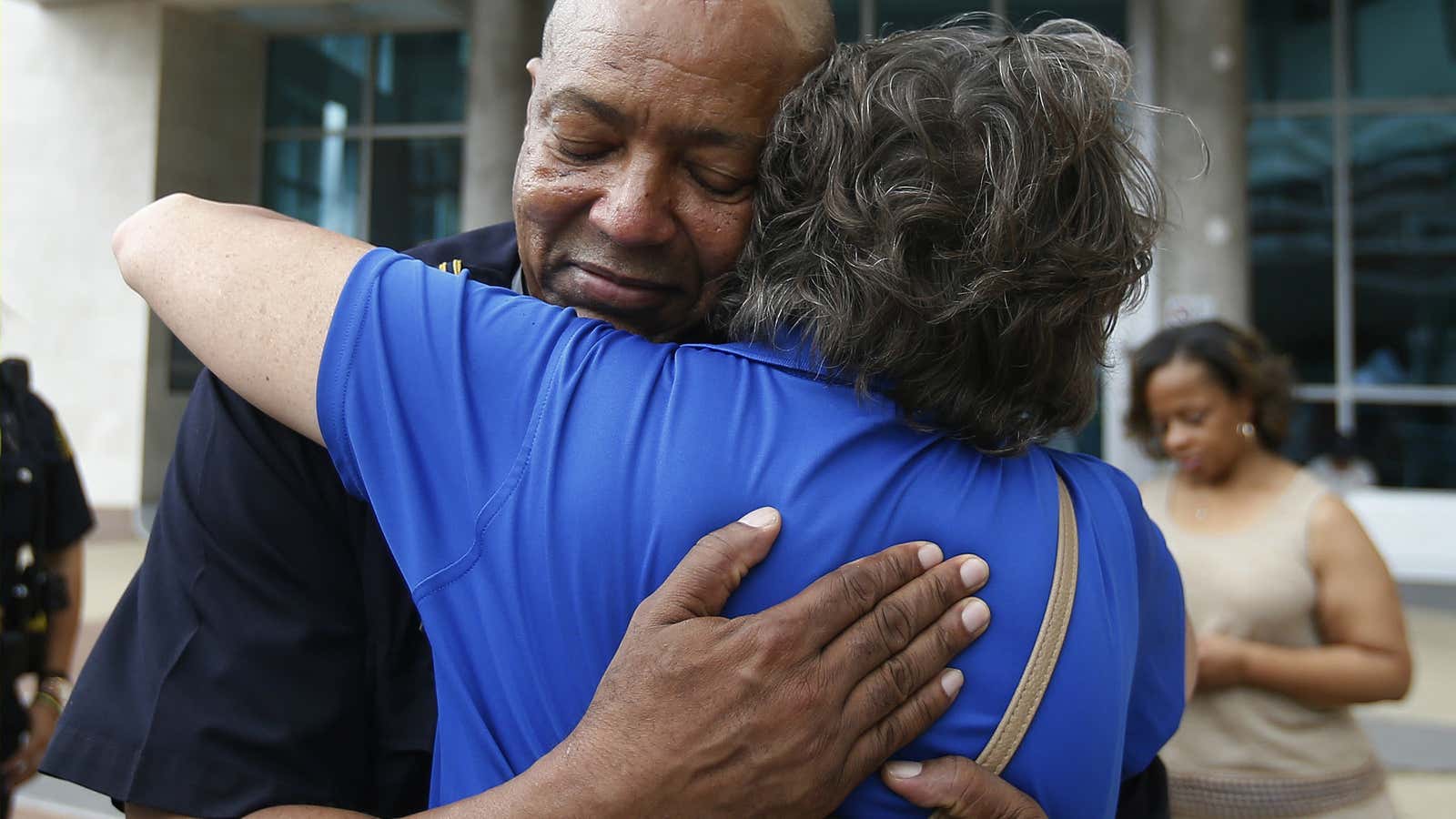How do we move forward after moments of trauma? It’s a question people around the world have unfortunately had lots of practice answering in recent days, weeks, and months.
While the US is still reeling from last week’s racially-fueled violence involving police, France today faces the aftermath of a horrific new terrorist attack in Nice, and the Islamic State ensured this was an especially bloody Ramadan across South Asia and the Middle East.
Connecting with the world—and engaging—is key. We’re not helpless. We can channel our emotions into meaningful action, whether by voting, calling elected officials, educating ourselves, or just expressing solidarity and empathy for our co-workers, neighbors, and friends.
And get outside! After a day glued to the news, I spent an hour Sunday night sweating on the tennis courts at a city park, surrounded by families barbecuing and singing “Happy Birthday” on blankets with balloons, while skateboarders skidded along the quarter-pipe. It has kept me going all week.
Take care of yourself, and others
Self-care is especially important in the wake of trauma—and it means much more than just treating yourself to a massage or retail therapy. As Colorlines’ Miriam Zoila Pérez pointed out, self-care is about connecting with your community and taking care of your body and mind—sometimes on the most basic level. (“Are you hydrated? If not, have a glass of water.”) In this video, by HuffPost Black Voices, people share their coping strategies:
Give yourself—and your employees, if you have them—time and space to process
The Cut’s Ashley Weatherford wrote about taking a personal day following the deaths of Alton Sterling and Philando Castile—to absorb the information, stay on the couch, read Claudia Rankine’s Citizen: An American Lyric, and eat ice cream. The Portland-based ad agency Wieden+Kennedy replaced its homepage with a note explaining why your black coworker may seem especially bitter, sad, or quiet right now.
Moving forward is not forgetting, and injustice should be acknowledged
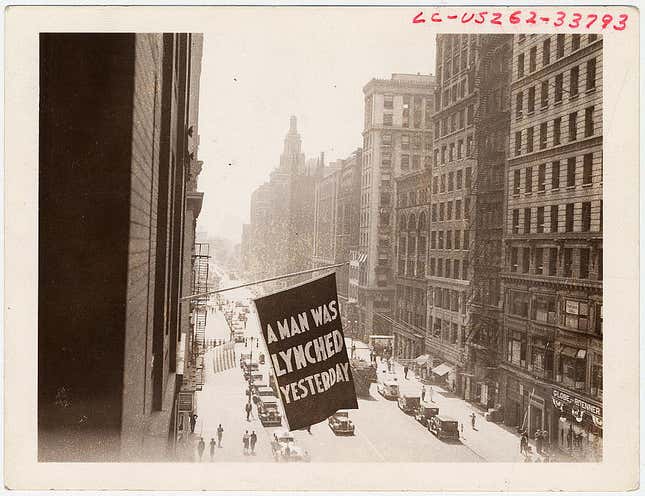
The artist Dread Scott has reprised a flag from the early 20th century that stated simply: “A man was lynched yesterday.” Back then, the flag flew from the Fifth Avenue headquarters of the National Association for the Advancement of Colored People (NAACP), reminding Manhattanites of the racist violence that plagued their country.
Last week Scott’s, which reads: “A man was lynched by the police yesterday,” hung outside the Jack Shainman Gallery’s 20th Street location in Chelsea.
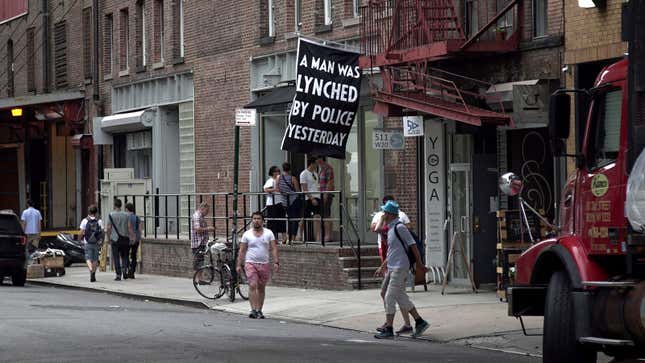
It’s never too late to get involved
“I’m 33 years old and it was my first time taking part in a protest,” writes the New York-based designer Maxwell Osborne, of Public School and DKNY, who recently joined a peaceful demonstration for Black Lives Matter in New York’s Union Square. “As a black man in an overwhelmingly white industry, race is never far from my mind.”
Having grown up in St. Louis, I felt heartbroken and alone when my hometown was at the center of conversations about racism in America, after the killing of Michael Brown in Ferguson, Missouri. One Sunday, I just took the subway to Manhattan and joined a march for unity. I still felt heartbroken, but I didn’t feel alone or helpless anymore.
Fight bias with empathy
Following the videotaped police shooting of Alton Sterling, a 37-year-old father, the Washington Post’s Robin Givhan implored readers to watch another video, of Sterling’s 15-year-old son crying for his dad. “It tells people that Sterling—this black man—was both loved and needed,” she wrote. “It simply defines him as knowable, which today seems like such an accomplishment.”
Find common ground
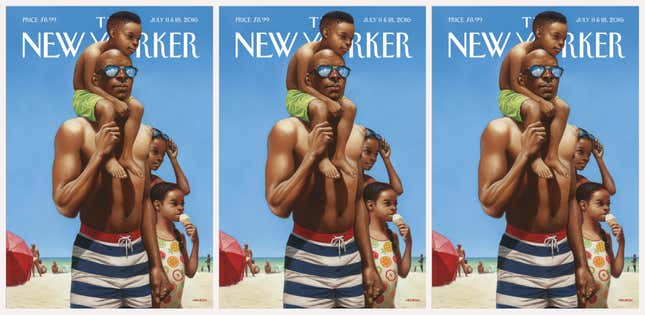
Experts Sarah Birdsong and Katie Kirkinis say exposing ourselves to more balanced, realistic images of men of color can help start to undo our harmful, unconscious biases. Kadir Nelson’s painting, ”A Day at the Beach,” which appeared on the July 4 cover of the New Yorker, is a helpful reminder of several self-evident truths: We all want the same things. We all have the right to enjoy a day off with our families. That little boy in the lime-green swim trunks has a right to grow up with a father.
Go outside and meet people
Like a gazillion others, I tried Pokémon Go this week, and found an evening with the augmented reality game in Central Park to be a pretty wholesome New York experience. (See here if you’re like, wtf is a Picachu?) I met some sweet strangers, discovered new landmarks, and almost stepped on a live rat.
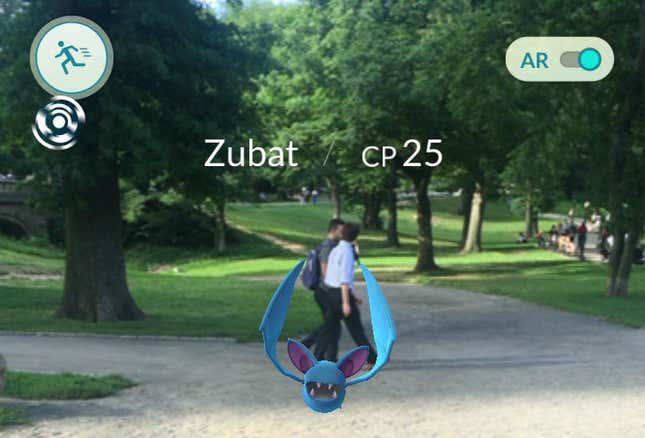
The game is worth trying at least once. If you’re not that into video games, here are my tips. If you are, here are my colleagues Nikhil Sonnad and Alice Truong’s.
Celebrate victories!
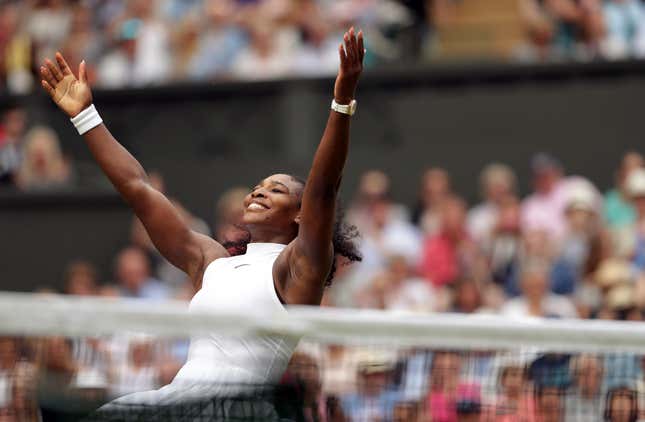
Serena Williams won her 22nd grand slam title at Wimbledon on Saturday. Then, Portugal won its first Euro championship the following day, against France. (That’s soccer, in case you’ve been too busy playing Pokémon Go.)
Empathy is all about putting yourself in the other guy’s shoes, even—or especially—when you’re on top of the world and he’s down in the dumps. That’s what’s on display in the scene below, in which a tiny Portugal fan pauses his post-game celebration to share a hug with a weeping Frenchman.
